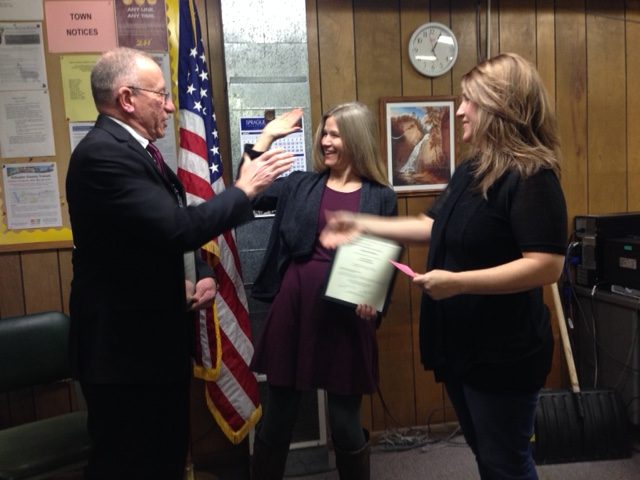Front line inoculations begin; CMC gets first COVID-19 vaccine
by Robert Lynch, December 23, 2020; updated at 4:45 PM
[Note: Since the posting of this report in late-afternoon, the Tompkins County Health Department reported Wednesday evening (12/23) another resident death from COVID-19, bringing the total number of Tompkins County resident fatalities to 13. Neither Tompkins County’s nor its Health Department’s websites reported the source of the latest fatality. But a media source quotes Public Health Director Frank Kruppa as saying this death, like 11 previous, occurred at Oak Hill Manor Nursing Home.]
Santa Claus came early Tuesday to Cayuga Medical Center, not to mention to the doctors, nurses and other front line staffers who work there.

That’s when the hospital received its first direct shipment of vaccine against COVID-19. The vaccine’s already gone into the arms of CMC’s front line staff, according to John Turner, Cayuga Health Systems’ Vice President for Public Relations.
“We’ll have vaccine to inoculate hundreds of workers,” Turner said, once promised shipments fully arrive.
The vaccine received Tuesday was a mixture of the Pfizer and Moderna varieties. Super-cold storage required for the Pfizer vaccine poses no problem, said Turner, since CMC purchased the special freezer needed and installed it around Thanksgiving.
Turner said federal security regulations prevent his hospital from disclosing the exact number of dosages so far received. CMC staff will be inoculated on a priority basis, determined by their degree of likely hospital exposure to the coronavirus.
Actually, some CMC personnel received coronavirus vaccine even before the shipments crossed the Tompkins County line. Several of the facility’s front line workers traveled to Elmira last Friday, December 18th and received shots at Arnot Ogden Medical Center there, according to a CMC release, issued Monday, but not then widely circulated. The hospital identified ER Physician Dr. Keith Lambert and Registered Nurse, Kate Rosa, as among those from CMC vaccinated that day.
“We are pleased to be able to offer the Pfizer BioNTech vaccine to our frontline workers at this time,” the release quoted Martin Stallone, President and CEO of Cayuga Health. “We know this is only the beginning of this fast-evolving process and we will remain diligent by doing our part for our own health care providers and within the community during the fight against this global pandemic.”
Yet while hospital staff and other eligible professionals may enjoy a newly-available local supply, patients and caregivers at local nursing homes may still have to wait.
“They’re on a separate track,” said Turner. He did say that Seneca View Nursing Home, affiliated with CMC’s Schuyler Hospital, will likely receive its vaccine next week. The State Health Department has indicated that many if not most nursing homes will receive their coronavirus vaccines through a network of pharmacies, including Walgreens and CVS.
Nearly all of Tompkins County’s resident COVID fatalities to date—reportedly 11 of the 12—have occurred at just one location, Ithaca’s Oak Hill Manor Nursing Home. Distribution of the Pfizer vaccine has been hampered to date by both the cold-storage issue and the bundling of that vaccine in huge batches of 1000 doses each. Because of that latter impediment, the State has sent much of the Pfizer vaccine to larger regional medical centers where it can more quickly be injected.
And there’s another stark reality: Tompkins County may find itself slighted by the State for having done its job too well. Tompkins County’s per capita COVID-related hospitalizations and deaths stand below some of its neighbors. Because of our enviable status, a County Health Department source concedes New York authorities are sending greater quantities of the vaccine to places like Binghamton, Syracuse, and Cortland County, rather than to Ithaca.
“It’s a function of how well we’ve done,” the source said.
Under New York’s vaccination prioritization plan, high-risk hospital workers, nursing home residents and staff, EMS workers, and now, long-term and congregate care residents and staff, as well as coroners and medical examiners, stand first in line for the vaccine. Teachers, childcare providers and certain high-contact essential frontline workers fall into the next-highest priority. Those over 65 or at high risk would follow.
****
In a related development, the Ithaca City School District confirmed Wednesday (Dec. 23rd) that District officials have agreed to make their facilities, including Enfield Elementary School, available as vaccination Points of Distribution (PODs) for use when vaccines become available to the general public.

Enfield Town officials have sought establishment of an Enfield POD to encourage vaccinations, to make the procedure easily accessible, and to eliminate the need for patients to travel to Ithaca or beyond to receive their shots.
A spokesperson for School Superintendent Dr. Luvelle Brown said Wednesday that school facilities, including Enfield Elementary and also Ithaca High School, would be offered to local health authorities “as needed.”
Patricia Mason, the County Health Department’s Preparedness Coordinator and the point person in the search for vaccination PODs, termed the District’s willingness “great news.”
The Tompkins County Health Department is currently weighing several alternatives for mass vaccine distribution, including a possible drive-through operation similar to that used for coronavirus testing at the Lansing mall.
###
County COVID deaths double, while vaccines elude us
by Robert Lynch, December 22, 2020
[Note: This story has been updated; see posting above]
In just one day’s time, the total reported number of local resident deaths from COVID-19 doubled Monday (Dec. 21st) from that of the day before, as the Tompkins County Health Department disclosed a ten-day cluster of new coronavirus fatalities, all at Oak Hill Manor Nursing Home; six more patients, bringing the County’s death count to 12.

Meanwhile, just like Ithaca’s first Walmart, and now Trader Joe’s, we locally must live with the reality that vaccines, like retailers, always head to the big cities first.
As the New York State Health Department touted the fact Tuesday (Dec. 22nd) that 170,000 doses of the Pfizer vaccine are now headed to the State and that “the first New Yorkers have already begun to be vaccinated,” not one of those shots to anyone’s knowledge has landed into the arm of any Tompkins County resident.
Instead, local health officials strongly indicate that smaller communities, like Ithaca, must wait for the easier-to-handle, more nimble-to-distribute Moderna vaccine, which the State says could arrive within its own borders as soon as next week, but not before.
The Monday, December 21st Health Department news release which reported the six additional Oak Hill Manor deaths—which now raise that one nursing home’s COVID death count to at least nine; and according to one media report as high as 11—made only the most general of references to the vaccine’s arrival.
“We’re looking forward to having our seniors vaccinated in the coming months,” said County Public Health Director Frank Kruppa in his prepared statement, adding “But while we await the vaccines, we can’t stop doing what we know works — wearing masks, keeping distance from one another, and being patient before we visit with loved ones.”
The local Health Department’s Monday release stated that Oak Hill Manor revealed the half-dozen newly-disclosed COVID deaths collectively to the State Health Department that same day. The six died during a ten-day span between December 12th and the 21st. The first two Oak Hill Manor coronavirus deaths were reported two days after Thanksgiving. A third death was reported a few days later. At the time of the initial deaths, Oak Hill Manor had reported that as many as 39 other patients and 13 staffers had contracted the disease.
Neither Oak Hill Manor nor the County has since updated the nursing home’s infection rate.
By law and/or executive order, the State Health Department investigates COVID deaths at nursing homes and has remained tight-lipped throughout the pandemic. Local officials did not in their release explain why Oak Hill Manor chose to aggregate the latest six fatalities or why their residents all apparently died at the nursing home, rather than being transported to a hospital where they might receive better care.
Kruppa explained to one municipal leader in a December 3rd conference call that some nursing home patients sign Do-Not-Resuscitate (DNR) orders which preclude heroic live-saving measures. Interviewed by the Ithaca Voice this date, Kruppa suggested that all of those who’d died at Oak Hill Manor had DNR directives. https://ithacavoice.com/2020/12/despite-covid-deaths-state-department-of-health-has-not-found-violations-at-oak-hill-manor-yet/
To date, the State Health Department has not revealed any disciplinary action it may have taken or may contemplate against Oak Hill Manor.
“Every death from COVID-19 in our community is heartbreaking,” said Kruppa Monday, “and our thoughts are with the families of those we lost and with those battling the disease. We continue to see those at highest risk having the most adverse health outcomes from COVID-19.”
As of Tuesday, the day after Kruppa’s most recent disclosure, his department reported 13 local coronavirus hospitalizations, 216 active cases, but no additional deaths.
Meanwhile, local patients must wait for the vaccine, even though Kruppa in his December third conference call had voiced more optimism about the life-saving inoculant’s quick arrival.
But in a later briefing to the Tompkins County Legislature December 15th, responding to Dryden legislator Mike Lane’s pointed question about timetables, the Health Director hedged, citing two logistical obstacles.
First, unlike Moderna’s version, the first-released Pfizer vaccine must, he said, be kept super-cold, and it requires “ultra-cold freezing capacity.” Despite that fact, however, Kruppa had earlier advised legislators that ultra-cold freezers exist at Cornell.
Secondly, in what Kruppa termed the “bigger” problem, the Pfizer vaccine comes only in batches of no fewer than 1,000 doses. Therefore, he said, the State ships to big city hospitals first, locations where all the batched doses can quickly find a willing arm.
“When you look at the way the State administered it across the region,” Kruppa told the County Legislature, “it’s difficult to send it to large numbers of places because it comes in that large batch of doses.”
“So the large medical systems (like those in Binghamton or Syracuse) are getting those doses initially,” he said.
The Moderna vaccine, by contrast, comes in smaller batches of 100 doses. “So it’s a lot more flexible in being able to send it to more places,” the Director explained.
To analogize, the problem equates to why Ithaca may lack a Macy’s or a Raymour and Flanigan’s; and also why Enfield may not rate its own Walmart, yet still has a Dollar General.
Nonetheless, with a coronavirus vaccine, one talks of lives, not dry goods. Tompkins County’s Administrator has reported it was a Queens woman who on December 14th received New York’s first coronavirus shot. That was more than a week ago. Lucky her. Meanwhile, local nursing home residents and their caregivers, subjects otherwise first in line to receive the vaccine, but for their misfortune of living in New York’s relative backwater boondocks, wait—and die.
###
“Let’s Move On”: James Ricks named to Enfield Board; Supervisor seat still open
by Robert Lynch, December 16, 2020, last updated December 21, 2020, 8:25 PM
“I have not heard any negative opinions about James Ricks per se. So we’re not talking about James Ricks. But we’re talking about the vehicle whereby a political group within this community that wields disproportionate power, sometimes from behind the curtain, has tried to engineer something whereby a person who is so eager and has such a feeling of entitlement to be Supervisor is being elevated to Supervisor via the back door. And I have been told by so many people, often quietly, Stand Your Ground, Bob.”
Councilperson Robert Lynch, Dec. 16th, explaining his initial reluctance to appoint James Ricks to the Enfield Town Board.
****
With Town Clerk Ellen Woods officiating and Councilpersons Virginia Bryant and this writer looking on, James Ricks took the Oath of Office late Monday afternoon (Dec. 21st) to become the Enfield Town Board’s first African-American member.

Ricks’ appointment to succeed Councilperson Stephanie Redmond, who resigned December 9th—yet who still very much seeks the open post of Town Supervisor—came Wednesday night, December 16th only after two of those remaining on the Board, aided by more than a dozen members of the public, leaned heavily upon the Board’s third remaining member, Robert Lynch (this writer) to abandon his earlier plans to delay Ricks’ appointment for almost a month.
“In a perfect world, I would rather keep this position open at least until mid-January, the Councilperson position, so that others who might be out there listening, watching tonight who said, boy, I’d like to have a seat on that Town Board, that they might be able to then apply,” said Lynch.
But in bowing to the intense pressure placed upon him from both within and outside the Board, the holdout lawmaker retreated. “I don’t want to keep this Board in a state of suspended animation for any longer. I will vote for James Ricks to be elevated to the Town Board tonight. Let’s move on.”
It took some 45 minutes of verbal arm-twisting by colleagues, and by Ricks himself, to force Lynch’s change of mind, followed by the Board’s unanimous vote. With the Enfield Board two members short—resulting first from Supervisor Beth McGee’s resignation September 30th, and then Redmond’s potentially strategic departure earlier this month—Lynch held the pivotal third vote to accord Ricks’ the legally-required majority.
The Town Board Wednesday never raised the more contentious issue of a Supervisor’s appointment. Redmond eagerly seeks the promotion. Members Virginia Bryant and Michael Miles support the elevation as well. But Lynch has urged the Board to keep the post vacant through next year’s elections. Once Ricks, a perceived Redmond ally, joins the Board in January, the aspirant could secure the votes she needs to advance.
A 71 year old grandfather and Enfield resident since 2004, James Ricks has never held local elective or appointive office. He describes himself as an activist, having involved himself in social justice and anti-war crusades. He applied in November for the vacant Town Board seat now held by Miles, and was one of only two who’d sought that appointment.
Though the Enfield Board this fall delayed for more than a month filling the prior Councilperson’s vacancy, Board members Bryant and Miles this time sensed greater urgency, neither favoring the delay that Lynch had urged, especially with a diversity-enhancing African American eagerly waiting in the wings.
“This is a huge risk and danger,” said Miles of the Councilperson’s vacancy, “because, you know, we have no Supervisor and a non-voting Acting Supervisor and a razor thin Board and we’ve had multiple resignations this fall.” He added, “And, you know, we’re in the middle of a mass pandemic that we haven’t seen in a lifetime.” Miles warned that one more illness or resignation could make the Board “nonfunctional.”
Though Stephanie Redmond remains Acting Supervisor and presides over Town Board meetings, a status held solely because of her prior appointment as McGee’s deputy, Redmond cannot cast votes since resigning as Councilperson. Ricks’ appointment would return the Board’s voting strength to four.
“Get this Board up to speed and move forward as quickly as possible,” counseled Bryant. Bryant praised Ricks as a highly-recommended willing learner. “And he’s also got the wherewithal to sit on the Board and listen and learn and express (himself) extremely well,” she added. “I really feel it’s an insult not to appoint him.”
Addressing the Town Board’s zoom meeting directly, Ricks said he sensed, but could not truly understand, a perceived “undercurrent” of controversy surrounding his appointment; even to the point of “vitriol.” Lynch offered an answer:
“James, that undercurrent that I think you’re talking about is what I see as political manipulation of this whole process and… that your appointment was being seen as the Second Act in a three act play. (The) goal is to appoint one particular person to Town Supervisor. The first step was Stephanie Redmond’s resignation last week. The second would be your appointment as a Councilperson. And then this, the third step, the final step would be your support of Stephanie Redmond as Town Supervisor, thereby circumventing my potential abstention. And that’s what I see as the undercurrent.”
“And so you see why you are a key link in the chain,” Lynch added. Toward dispelling his own suspicions, Lynch suggested Ricks recuse himself from any subsequent Supervisor’s vote. Ricks declined to do so. Bryant termed recusal “inappropriate.”
Lynch stressed he finds nothing disqualifying about the newest appointee’s record, though he cited the newcomer’s lack of governmental experience, a deficiency Lynch pledged to help him remedy. Ricks returned the compliment.
“I’ve even told people after listening to the meetings, man, like if I was in war, you’d be the guy I’d want in the foxhole right next to me,” Ricks said of Lynch, though quickly adding, “But we’re not at war here.”
****
As many as fourteen Enfield residents, past or present, voiced their opinions at Wednesday’s zoom session, providing Ricks’—and also, potentially, Redmond’s—appointments lopsided endorsement. Reverend Olivia Armstrong, the only African-American addressing the Board, praised Ricks as “passionate” and “community-oriented.”
“You have a good choice. We have a good pick,” said Armstrong of Ricks. “He’ll fight. He’ll go to jail. He’ll do anything for the fight for justice.”
Former Supervisor Beth McGee weighed in as well, urging Board members, especially its two male Councilpersons, to seize their opportunity to cast aside white privilege.
“A majority of white men serve here as gatekeepers to yet another Councilperson vacancy,” observed McGee, who then posed to those men her questions. They included, “What do I lose by making space at the table for people who are different than I am;” and “Why is it important to me to keep people of color outside of the spaces where decisions are made about our community?”
There was yet a further idea McGee posited, one almost lost in the night’s deliberations over Ricks. The ex-Supervisor, Redmond’s mentor, suggested her former deputy boldly decline the Supervisor’s appointment were it offered to her. As McGee would have it, Redmond could continue as Acting Supervisor, yet dispel purported “conspiracy theories” surrounding Redmond’s alleged strategic moves.
“The Acting Supervisor doesn’t need an appointment to Supervisor to be the incumbent,” McGee insisted.
But the former Supervisor’s suggestion never met its test. The Enfield Board delayed Redmond’s promotion until another day.
What may have been tested, however, were Enfield leaders’ nerves, minds and patience. Acting Supervisor Redmond inadvertently sought votes on the Ricks’ appointment twice, forgetting that Town Clerk Ellen Woods had already called the roll. At about the same time, Redmond silenced Woods’ online mic after the Clerk bluntly chastised the Acting Supervisor for alleged “abysmal, elitist,” and abusive treatment.
And focusing on the insular intrigue that surrounded the Ricks and Redmond appointments, last year’s losing Supervisor candidate, McGee’s opponent, Amanda Kirchgessner, after introducing Reverend Armstrong to the Board, weighed in with her own assessment:
“I think it’s really important that you focus on the greater task at hand, which is making sure that the people of Enfield are actually getting their basic needs met right now. So you guys need to get your act together, period; end of story.”
###
Moving up, moving on; Anna Kelles resigns Tompkins County Legislature
by Robert Lynch, December 19, 2020
“I will not forget my roots.”
With that promise and plentiful praise for her colleagues, Assemblywoman-elect Anna Kelles Tuesday night (Dec. 15th) tendered her resignation from the Tompkins County Legislature, a formality everyone expected, but whose timing Kelles had kept a closely-guarded secret.

The newly-elected Assembly member’s departure, effective at year’s end, will set into motion plans for a special election to succeed Kelles in her Fall Creek-anchored district. The Board of Elections has yet to announce the voting date.
In an impromptu resignation speech that she would later in the meeting describe as “cheesy,” Kelles said she wanted to “gush” at how much she’d appreciated working with County legislative members and staff during her five-year tenure, as well as to give credit to them for how much she’s learned.
Those five years, said Kelles, “have made me who I am.” They’ve, “hardened me in some ways, humbled me in other ways.” They’ve been “deeply educational, trained me for the work that I’m going to be doing at the State Legislature.”
To succeed retiring nine-term incumbent Barbara Lifton in representing the State’s 125th Assembly District that serves Tomkins and southern Cortland Counties, the Ithaca Democrat beat six opponents in a crowded June primary and then cruised to a landslide victory November 3rd. The Tompkins County Legislature paid tribute to both Lifton and Kelles Tuesday following the latter’s resignation.
At times scripted tongue-in-cheek, the Legislature’s proclamation teased Kelles for her boundless energy, “curiosity, overzealousness, grit, quirkiness,” and wonkish attention to detail. But her thirteen colleagues also congratulated and saluted Kelles for her “passion, dedication, arm-twisting, over-communication, knowledge about the issues, transparency, and big heart.”
“Anna’s passion for the issues,” the proclamation stated, “lead her to over-research, over-explain, over-present, and outlast her colleagues for anyone who disagrees with her positions because, in the end of it all, she’s mostly right.”
“I’ve been feeling really nostalgic the last couple of weeks,” said Kelles, after her zoom meeting colleagues home delivered a surprise gift package that included flowers and tissues (Anna often catches colds).
“I’m going to miss you,” Kelles said wistfully. “I’ll miss arguing with you… collaborating with you… brainstorming with you… (and then) arguing some more with you all, really. I just appreciate everything you’ve taught me.”
****
Kelles’ final local legislative achievement occurred shortly thereafter, as the County Legislature unanimously restructured the County’s Industrial Development Agency to replace one of the IDA’s four members drawn from the Legislature with a representative drawn from organized labor instead.
Legislative Vice-Chair Shawna Black reported receiving “dozens” of public comments in recent days supporting the Kelles-backed initiative. Two of those letters were read at the meeting’s start. Four supporters addressed the body in person.
Placing a labor rep on the IDA is seen by many as a way to encourage developers enjoying IDA-awarded tax incentives to employ local construction tradespeople, rather than those from distant cities.
“Too often IDA-funded development projects only serve to displace working folk by raising municipal rent prices and outsourcing labor to workers who live outside our county,” wrote one of those supporters, Ben Hunkler.
No one objected to the membership change. Yet Lansing Republican Mike Sigler questioned whether the labor-dedicated seat should be more restricted, narrowed to trade unionists only.
“We want the persons that are building these structures to have a say,” Sigler remarked.
Before their final vote, County lawmakers rejected a substitute motion that would have expanded IDA membership from seven to nine, the amendment’s opponents arguing the change in number might require state legislation and would delay bringing a labor rep on board.
###
Tompkins lawmakers freeze legislative salaries for three more years
by Robert Lynch, December 15, 2020
For the next half-decade, an elected member of the Tompkins County Legislature will earn less money than will the Enfield Town Supervisor.

In a quickly-dispatched, unanimously-endorsed Resolution Tuesday (Dec. 15th), the County Legislature adopted a committee’s recommendation to freeze its members’ salaries at $21,400 through 2023. After that, salaries will creep upward by three per cent in 2024 and another three per cent the following year, ending in 2025 at $22,700.
The Legislature’s decision means its lawmakers’ pay will stay the same for a full six years. The fourteen members have each been paid $21,400 since 2018.
By contrast, the Enfield Town Board, through departed Supervisor Beth McGee’s 2021 budget, will hike its chief legislator—the Supervisor’s—salary twenty per cent next year, raising it from $20,000 to $24,000. McGee had argued the current Supervisor’s pay is too low.
Enfield’s four other lawmakers, the Councilpersons, earn far less than will the Supervisor, just $3,500 per year. Their annual salary will not increase next year. In addition to legislating, the Town Supervisor also handles administrative tasks.
While some County lawmakers, particularly Dryden’s Mike Lane, took pride Tuesday in the hold-the-line stance on salaries, others, including Ithaca’s Anna Kelles, who’s leaving the County Legislature at year’s end for the State Assembly, expressed reservations. Kelles mildly regretted her colleagues had not resurrected the debate of four years ago when some 40 members of the public had urged lawmakers raise the legislative wage to a “living wage.”
Current pay, Kelles argued, “excludes low income people from sitting on the Legislature.” While the County’s rules do not set minimum working hours, Kelles judged that from her own experience, the work commitment comes “close to a full-time job.”
“Even if half their job is $6.00 an hour,” said Kelles, they, the potential legislators, “can’t take this job.” The Assemblyperson-elect would have preferred at least a two per cent annual increase.
In 2016, County Legislators agonized much more over their salaries than they did Tuesday night. The 2016 debate lasted some 90 minutes. The vote was divided, eight-to-six. And ironically, reports at the time indicated the pay arrived at “incorporate[d] the County’s support of the concept of a living wage.”
Nonetheless, proponents in 2016 had acknowledged County Legislature service is a part-time job. Should one now adopt Kelles’ 40-hour per week benchmark, a $21,400 annual salary would compute to only $412 per week or $10.29 per hour, far less than the so-called “living wage,” now reportedly $15.37 per hour.
In Enfield, Town Clerk Ellen Woods has repeatedly maintained that her own compensation—which like the Supervisor’s, will rise next year to an identical $24,000, should her tax collector’s pay also be considered—remains too low. Woods asserts her responsibilities are full-, not part-time.
The Ithaca Town’s Amanda Champion, whose committee advanced Tuesday’s County Legislature Resolution, conceded she “would have pushed for an increase” in next year’s pay, but didn’t.
“It feels a little bit not quite right,” Champion concluded, for lawmakers like her to increase their own pay while so many others are losing their work.
But unlike four years ago, County legislators spent little time Tuesday on the issue of pay. The salary issue consumed a mere five minutes of the Legislature’s nearly five-hour marathon meeting. Instead, members ate up three-quarters of an hour fine-tuning new legislative meeting rules; then, for the most part, reverting to procedures currently followed.
On one point of meeting minutiae, still unresolved, Danby’s Dan Klein suggested legislators begin time-limiting their own privileges of the floor for their often open-ended discussions. Klein equated legislative loquaciousness to the hoarding of toilet paper at the start of the COVID pandemic.
###
Redmond resigns Town Board; assails Lynch for blocking her promotion
by Robert Lynch, December 9, 2020; updated December 11, 2020; 11:30 PM
“I have a thick skin,” Enfield Councilperson Robert Lynch (this writer), said at one point during Wednesday’s (Dec. 9th) marathon Town Board meeting. He needed it.

During a nearly four-hour session that began with civility, yet at midpoint, quickly devolved into personal attacks and allegations bordering on charges of racism, Councilperson Stephanie Redmond assailed Lynch for not only blocking her own promotion to the vacant post of Supervisor, but also for, by his inaction, preventing James Ricks from presumptively assuming the Councilperson’s seat Redmond would then vacate and become Enfield’s first African-American Town Board member.
With Redmond irate and Lynch not budging, Redmond then abruptly resigned as Councilperson, effective immediately.
“I am definitely going to resign. I’m definitely going to resign,” exclaimed Redmond. “I will still act as the Deputy Supervisor and therefore be the Acting Supervisor. However, my seat will be open and I will make this seat available to James Ricks because he fully deserves this. And the Town fully deserves a level of inclusiveness from this man.”
“Stephanie, you have no right to bequeath your office to someone else,” responded Lynch.
“I’m not bequeathing my office. I’m opening this seat up. And if you do not vote for him, you will show your own cards to this Town,” an irate Redmond retorted.
So, once again, the Enfield Town Board stands at just three members, its legal minimum. Though Redmond will preside at meetings, she will have no vote.
Each of the remaining Board members; Lynch, Virginia Bryant, and newly named Councilperson Michael Miles, urged Redmond to reconsider her departure. Lynch begged her to change her mind at least three times. “Sleep on it,” counseled Bryant. Nonetheless, Redmond held firm. At meeting’s end, less than an hour before tendering her written resignation, the departing Councilperson delivered a closing monologue, again lauding her accomplishments as Deputy Supervisor and impugning Lynch’s alleged political motives for his standing in the path of her promotion.
Redmond also took pains to praise her political mentor, former Supervisor Beth McGee, who’d transparently groomed Redmond to be her successor for nearly six months before McGee, herself, resigned September 30th.
Though few others would have known it, McGee viewed the entire zoom meeting from behind a cryptic graphic on her blackened tile, her identity not revealed until meeting’s end. She never spoke.
The Town Board will first attempt to pick up the broken remains of Wednesday’s shattered meeting in a special session called for Wednesday, December 16th. Miles has said he will nominate Redmond for Supervisor at some future session, perhaps then. Bryant expects to support Redmond’s elevation as well. But Lynch has resisted, insisting voters prefer to keep the seat open through next year’s elections. Lynch has told colleagues not to expect his vote either on Supervisor or on filling the new Councilperson vacancy next Wednesday.
“I have put heart and soul into this for the last six months,” Redmond said of her work Wednesday. “And it’s not for the money…. I could go make a lot more money somewhere else. I’m doing this because I was born and raised in Tompkins County. I’m doing this because I built a house here. I’m doing this because I have three kids, and I have a vested interest in the future. And it is repeatedly, repeatedly been negatively politicized by Robert Lynch over and over again as if I had some sort of sinister ulterior motive.”
Redmond insinuated that Lynch’s own ulterior motive is to run for Supervisor himself and to deny Redmond the benefit of incumbency. Lynch denied the allegation, saying his “odds on” feeling at the moment was not to run, though he admitted his opinion might change.
Those skilled in political strategy might find their own “ulterior motive” in Redmond’s timed departure.
In a revised opinion shared with Board members this week, Guy Krogh, the attorney for the Town, advised the Board that in any vote for Supervisor, Redmond should not only cast no vote, but also preferably resign her Councilperson’s seat first. Citing a 1923 New York trial court case, overruled in part by subsequent statutes, yet still respected for its reasoning, Krogh concluded that elevating a seated, even non-voting Board member to Supervisor “looks bad”…” is against public policy,” and raises the “appearance of bias or taint.”
Thus, given Redmond’s thirst to become Supervisor, her prior resignation would become necessity. She would need first to resign. Then the remaining Board would select a pro-Redmond partisan to take her place. Only thereafter could the new three-member majority circumvent Lynch to appoint Redmond to the job she wants. Lynch’s only power would be to block the new Councilperson’s appointment.
Therefore, James Ricks, a known favorite of both Redmond and McGee, could become a key ally in Redmond’s effort.
For several meetings, Enfield’s Town Board has either deadlocked on filling the Supervisor’s post McGee vacated, or it’s simply given up trying. After two initial attempts failed, former Councilperson Mimi Mehaffey, herself, resigned October 5th. Mehaffey’s departure prompted Miles’ appointment. James Ricks, known for his activism in racial and left-wing causes, competed against Miles for the Board’s appointment. Though the final vote for Miles in November was unanimous, Redmond initially favored Ricks.
Often, during her departing comments Wednesday, Redmond placed more importance upon Ricks’ potential contributions of racial, diversity than she did on her own purported achievements. Redmond called the denial of Ricks’ presumed appointment—blocked until she, herself, is elevated—an “incredibly disgusting display of white supremacy.”
“It’s just humiliating for our Town…. We have no black man that has experience on this Town Board because we’ve never had a black man on this Town Board. And now we have one that is willing and able and cares to be willing to serve.”
As to her own need for promotion, Redmond cited the risks of COVID-19. Only the Supervisor and Deputy Supervisor can pay Town bills. Without her promotion, Redmond cannot hire her own deputy, a needed second-in-command, she insisted, should COVID place her in quarantine.
“You have a moral obligation to serve this Town instead of yourself,” Redmond said to Lynch. “I’m so upset you would keep us in a position where I could be quarantined for months on end and leave us months behind. Anything could happen to me. And what would happen to these bank accounts? What would happen to paying all these things?”
Redmond ignored the fact that under current state rules, as an essential employee under quarantine, she could still report for work, barring symptoms, and only be home-bound after-hours.
Leadership succession talks Wednesday consumed nearly an hour of the Enfield Board’s time. They began calmly, with Redmond recusing herself. Emotions heightened only after the Deputy Supervisor re-entered the talks and Lynch insisted that the Board invite additional applicants should any new Councilperson’s vacancy arise. At that point, tensions mounted and Redmond quit.
“There’s no reason not to appoint me,” said Redmond, touting her resume, with Lynch her intended audience of one. “I am highly educated. I have years of experience in community organizing. I have dedicated so much—and I’m in a privileged position with a spousal income so that I can work tirelessly for several hours a week; many—I mean, an enormous amount till like midnight every night for a minimal income. It’s ridiculous.”
What may, in part, have prompted Redmond’s pique was Lynch’s scripted explanation of why, at least for now, he’d prefer to leave the Supervisor’s post vacant.
“During the two weeks prior to Election Day, I visited 604 Enfield residences, homes to a majority of our voters,” said Lynch. Among those he met who expressed an opinion, “Overwhelmingly, without prompting, most told me to keep the seat open until next year’s elections.”
“So, if I pull that ripcord tonight, if I go with the flow, I’ll be cashing in a ton of political capital,” the holdout Councilperson remarked. “I’ll still do it if I know it’s what’s best for Enfield. But it may cost me re-election in 2023. It may also cost each of you the same when your date at the polls comes due.”
Lynch insisted his objections against Redmond’s promotion were neither personal nor political. But the Deputy Supervisor’s rapid-fire verbal assault eventually taxed Lynch to his limit. It prompted a pointed critique explaining his second reason for reticence.
“One of the things I’ve been waiting for,” said Lynch, “is for Councilperson Redmond to step up and be her own woman, to be her own leader… and not be the puppet of Beth McGee.”
“Oh, for God!” blurted out an irritated Bryant.
Recently-appointed Councilperson Michael Miles, the self-designated referee of the night, sought compromise, but acknowledged that an elusive middle-ground may not exist.
“I would love to see James on the board,” said Miles, “but I have a feeling that the last 10 minutes of discourse is only making, you know, people cemented in their own decisions.”
“I think they’re cemented, anyway,” observed Redmond.
****
The succession and resignation fireworks Wednesday overshadowed the Enfield Town Board’s earlier unanimous adoption of a three-year contract with the Enfield Volunteer Fire Company. The EVFC contract calls for two per cent increases in Town funding in each of its final two years, plus up to $35,000 spent annually by the Town to upgrade protective firefighting outerwear for volunteers.
Former Supervisor Ann Rider of the Enfield Community Council (ECC) also announced her group is near closing on purchase of the former Living Water Church in Enfield Center for use as a community center.
###
Absentees and Early Votes flip Enfield back to “Blue”
by Robert Lynch, December 6, 2020
Many Democratic-leaning Enfield voters stayed home on Election Day.
They didn’t need to vote. They’d already done so. Or at least they’d put their ballots in the mailbox.

Final and official results from the 2020 General Election, released last week by the Tompkins County Board of Elections, revealed that Enfield’s early votes and absentee ballots, while only a minor proportion of the total votes cast, swung disproportionally in Democrats’ favor, propelling President-elect Joe Biden, Assemblymember-elect Anna Kelles, and the two losing Democratic candidates for Congress and New York State Senate to win majority support among the town’s voters.
So the “red wave,” suggested by the Republican-leaning machine totals the night of November third, never really happened.
The final Enfield results, now broken out for each of the Town’s three election districts, show President-elect Biden having captured the support of 58.4 per cent of Enfield’s voters, the President-elect securing 1,031 Enfield votes to President Donald Trump’s 707.
Though they each lost to Republican incumbents overall in their respective races for Congress and New York State Senate, Democrats Tracy Mitrano and Leslie Danks Burke each chalked up majorities in Enfield’s final vote. Mitrano secured 1,009 Enfield votes (58.5%) against Congressman Tom Reed’s 693 votes (40.2%) and Libertarian Andrew Kolstee’s two dozen votes. Danks Burke garnered 987 Enfield votes (58.3%), compared to State Senator Tom O’Mara’s 707 (41.7%).

Newly-elected State Assembly candidate Anna Kelles chalked up the largest percentage victory margin. Whereas it appeared Election Night that Kelles would fall some ten points behind her Republican opponent, the more recently counted early and absentee votes actually pushed Kelles’ final margin over the 60 per cent mark, the Ithaca Democrat beating Matthew McIntyre in Enfield, 996 votes (60.2%) to McIntyre’s 659 (39.8%).
Reflecting the trend observed nationally, Enfield’s early and absentee vote broke decidedly Democratic, perhaps even more so than some observers had predicted.
For example, interpolating the Board of Elections final data and comparing it with the same-day machine totals—the Elections Board’s latest tallies do not segregate absentee ballots and early votes from the overall totals—one finds that a whopping 83.5 per cent of early and absentee voters (587 voters compared to 116) voted for Joe Biden rather than for Donald Trump.
Similarly, in the Congressional contest, 558 of early or absentee voters (79.3%) supported Democrat Tracy Mitrano. And 82.5% of those who’d voted early or absentee voted for Democratic Assembly candidate Kelles; 79.9% for Danks Burke.
Indeed, an overview of the election returns, just as on Election Night, suggests overwhelming straight-ticket voting. Down-ballot candidates grabbed voter-awarded coattails from their respective Presidential standard-bearers. Joe Biden’s victory margin in Enfield stood only within a point or two of the majorities secured by Mitrano, Kelles, and Danks Burke. In his race, Biden bested Trump by 18.4 percentage points Town-wide.
Comparing the 2020 Enfield Presidential race to that of 2016, some things have changed; but others have not. Voter turnout was higher in 2020, mirroring the national trend. Biden drew 204 more votes in Enfield than Hillary Clinton did in 2016. But Trump drew more votes as well, 79 more. And while Democratic Presidential support grew by 24.7 per cent during those four years, much of the Democratic gains apparently stemmed from the lack of viable third-party candidates to bleed off Democratic support, third-party spoilers like 2016’s Jill Stein and Gary Johnson.
But despite the 2020 statistical Democratic advantage, a stubborn fact remains. President Trump’s support among Enfield voters remains rock-solid. Whereas 40.2 per cent backed the outspoken Republican nominee in 2016, 40.0 per cent of Enfield’s electorate did so this November.
Final official returns made only miniscule change, if any, in the resounding rejection of two proposed Enfield Local Laws, which would have changed the Town offices of Town Clerk and Highway Superintendent from elected to appointive. As previously reported, each proposal lost by a margin of greater than four-to-one. (See story of November 19th.)
****
Beyond Enfield’s borders, in all of Tompkins County, Ithaca-centric liberal preferences kept it a cool-blue island often surrounded by a rural upstate sea of Trumpian red. Joe Biden secured 73.6 per cent of the Tompkins County Presidential vote, earning 33,619 votes to Trump’s 11,096.
Tracy Mitrano, despite losing to Reed badly—for this, the second time—in her Southern Tier district, captured 72.5 per cent of Tompkins County’s support. Kelles claimed Tompkins County, the electoral anchor of her 125th District, with 73.4 per cent of the vote to McIntyre’s 26.5 per cent.
Kelles declared victory in her two-county Assembly contest November 13th. Mitrano and Danks Burke have each conceded defeat in their races.
Enfield’s results worked to defy congressional candidate Mitrano’s optimistic prediction two years ago that with improved name recognition, her rematch with Reed would bring her better results. At least in Enfield, it didn’t work. While Democrat Mitrano won over 63 per cent of the vote in 2018, she got just 58.5 per cent of it this time, despite improved voter turnout. And while 145 more voters in Enfield turned out for Tracy, 190 more turned out for Tom.
As the turnout of early voters and COVID-cautious relaxed mail-in ballot rules helped leverage final votes in the Democrats’ favor, voter response to the brave new world of 21st Century voting, at least in Enfield, remains under-whelming. Hometown voters still like their Election Day. While the Board of Elections reports that 314 Enfield residents voted early, and about another 389 voted absentee, a full 60 percent of Enfield’s electorate still voted in person on November third. What tipped the scales was that Democrats appeared to favor electoral innovation far more than did Republicans. Or else, of course, Trump voters may have heeded their President’s heralded call to vote the old-fashioned way.
****
For election geeks who wade into the political weeds (like this writer), the Enfield numbers yield a puzzling statistic, one that on its surface defies explanation. As in 2016, and again two years later, Enfield District Number One—it begins on the center line of Mecklenburg Road and extends south about as far as Enfield Center and Bostwick/Harvey Hill Roads—appears more conservative than either of its neighboring districts, either to the north or south. District One includes Enfield Center. But that shouldn’t matter, should it?
In District 2 (north of Route 79), Joe Biden won 62.6% of the Enfield vote. The President-elect found just over six-in-ten support in District 3, to the south. But in District 1, only 52.4 per cent of residents backed Biden. The quirk repeated itself down-ballot. In District 1, Mitrano and Danks Burke just eked out majorities (about 51%). It’s a brain-teaser for all to ponder as we plan the next election—and likely soon, reapportion our whole Town.
We are “One Enfield,” aren’t we?
###
Kruppa: Vaccine here in weeks (probably), but only for a few
by Robert Lynch, December 3, 2020
A little is better than none at all—at least when it comes to the vaccine against COVID-19.

Tompkins County Public Health Director Frank Kruppa provided local municipal leaders some encouragement Thursday morning (Dec. 3rd) during a County-sponsored conference call that’ll now resume becoming a weekly ritual. He predicted the first vaccine against the coronavirus could arrive locally “in the next few weeks.”
“We’re likely to get a small amount of vaccine,” Kruppa said. It will probably be of the Pfizer variety; it’ll probably initially be just one batch of 1000 doses; and it’ll be earmarked for select populations, namely health care workers and those in long-term care facilities.
The Director’s comments reflected the best predictions from state and federal health authorities. And his forecasts rested on only as much solid information as people with pay grades higher than Kruppa’s stand willing to provide.
But at least it’s a start. And the 1000-dose prediction was enough to buoy the spirits of Thursday’s conferees.
Like most of the COVID-19 vaccines now poised for approval, Pfizer’s would require each subject to receive not one, but two inoculations, each a few weeks apart. One conferee asked that assuming the first batch of 1000 doses gets used on that same number of high-risk patients and front line workers, what happens when they need dose number two? Kruppa predicted that by the time the second dose is needed, more vaccine would arrive.
The Health Director described the likely local vaccination regimen as a “small methodical rollout.” He admitted his 1000-dose projection stands only as a “planning assumption.” And he said the logistics for any mass inoculations will depend on “how much vaccine we get and when we get it.”
County health planners have long kept on the shelf—but never fully implemented—a “Medical Countermeasures Plan,” a strategy first advanced by federal authorities following the 2001 Anthrax scare. Under the plan, the Department would designate one or more “Points of Distribution,” (POD’s) in each municipality. At a municipal briefing in August, a health official, one no longer employed by the Department, indicated that an “Open POD,” a site available to everyone, had not yet been designated in Enfield.
But with a COVID vaccine now in the offing, the local Department is dusting off the POD concept. Still, because of uncertainties in timing and vaccine availability, Kruppa could not predict Thursday whether initial mass distribution would occur in “one large drive-through” center or through “targeted POD’s.”
On a related matter, namely the three recent COVID-19 deaths announced within the past week at Oak Hill Manor Nursing Home, credit Ithaca Alderperson Cynthia Brock for asking Thursday the question perhaps most on people’s minds: Why did those three patients die at the nursing home, rather than be taken to a hospital where they’d likely receive better care?
To that question, Kruppa could only speculate. He suggested that patients in nursing homes often sign Do-Not-Resuscitate (DNR) orders. Were that the case, staff would allow the patients to pass peacefully, rather than attempt extraordinary measures. Yet the Director could not be sure, handing off further questions to the State Health Department—typically tight-lipped—the agency tasked with investigating New York’s nursing home coronavirus fatalities.
Alderperson Brock urged officials probe the “management and oversight” which allowed those deaths to occur, not to mention the additional 39 COVID infections also reported last weekend among Oak Hill Manor’s patients.
At the time when the first two Oak Hill Manor deaths were disclosed, Saturday, November 28th, the County Health Department had reported only six active COVID-19 hospitalizations locally, all presumably at Cayuga Medical Center. The number had been just two the prior day, with two COVID patients’ having been discharged then.
Since the weekend, the hospitalization number has risen to as high as ten on November 30th, then down to four just two days later. Late on Thursday, December third, the date of the conference call, hospitalizations stood at five, with no additional fatalities reported since the third death at Oak Hill Manor was disclosed on Sunday.
“We are seeing our highest numbers of cases since the start of this pandemic,” Kruppa said in a prepared statement released by his Department Wednesday. “More than half of our 34 cases on December 1 are connected to Thanksgiving gatherings and related travel,” he added.
###
Planning Board slates Applegate Road Solar Farm for January Hearing
by Robert Lynch, December 2, 2020

“The application looks pretty complete,” said Chair Dan Walker, as the Enfield Planning Board Wednesday (Dec. 2nd) took a pair of procedural steps that’ll advance Norbut Solar’s proposed 20 Megawatt solar farm—Enfield’s largest—toward likely approval and eventual construction.
By unanimous votes, the Planning Board designated itself as the “lead agency” for a detailed state-mandated environmental review and also designated January 6th for a Public Hearing to allow residents to weigh in on the $27 Million project. It would be sited east of Applegate Road across from Johnny’s Wholesale and the Neno airfield. Norbut first revealed its plans in October.
Enfield planners and Town Board members have voiced general support for the project, believing it would blend in well with Enfield’s rural character and contribute to the Town’s tax base. Three of Enfield’s four current Town Board members attended Wednesday’s online session.
For nearly 90 minutes Wednesday, the Planning Board conducted its preliminary review of Norbut’s slightly revised proposal, questioning company officials on issues ranging from wetlands protection, to construction noise, to how much money Norbut might pay into the Town’s treasury.
“We’re trying to design it to work with the land,” said Dan Huntington, Norbut’s Business Development Manager. Huntington explained how the company has moved and altered the proposed four-quadrant array slightly so as to protect sensitive wetlands nearby. As revised, the easternmost quadrants would occupy slightly more area than those to the west, but would each generate the same amount of electricity. Huntington called them “minor” changes, but “positive ones.”
Perhaps the most newsworthy revelation Wednesday concerned completion timetables. Norbut officials would still like to secure Town approvals this winter, negotiate so-called “PILOT” tax-abatement agreements in early-spring, and then commence construction next summer. But in contrast with earlier inferences, Huntington said he doubted crews would finish and energize the system until 2022. He said next year’s work would more likely limit itself to site preparation. It’s tough to erect solar farms in winter, he said.
While no one objected to the solar project, some planners voiced concerns about construction noise, specifically a possible prolonged period of post-pounding into the soil. Some drew the analogy to the loud noise of pile-driving at Ithaca’s Wegmans, or more recently, at that city’s Hancock Street housing project. Norbut officials assured the Board that the noise from pounding posts is far more muted. They also said that just because authorities allow Norbut a 30-month construction window, post driving would not occur all that time.
The company would site the solar farm back considerably from the parcel’s road frontage and have it occupy only about half of the 249-acre tract Norbut plans to buy. But what would come of the remaining acreage? Some portions, comprising old-growth woods, would be left undisturbed. But at one point, John Stone, project manager, suggested existing farm land would just be allowed to revert to nature and provide a visual buffer.
Councilperson Robert Lynch (this writer) countered that he’d prefer the land to remain farmed, a use more compatible with Enfield’s rural character and in keeping with the Town’s Comprehensive Plan. Stone responded he’d consider finding a farmer who’d till the fields.
Town tax returns from the multi-Million dollar venture remain far from set. By law, the County’s Industrial development Agency (IDA) would negotiate the PILOT taxing agreement, perhaps with Town input. The Enfield Town Board could also negotiate a “Community Host Agreement,” a side-deal of sorts, to sweeten its compensation. Stone indicated that the amount of the Host Agreement could depend upon how much money remains after the PILOT’s revenues—parceled out to the Town, County, and local school district in set percentages—are determined.
“It’s a lot more than we’ve had in the past,” observed Walker of the Norbut proposal, noting its size and potential energy output.
It’s a lot of paper, too. The pile of environmental studies and maps the company presented the Planning Board stack about an inch high. A copy will be placed on file at the Town Clerk’s Office for review. Walker instructed Planning Board members to review them as homework prior to the January 6th Hearing.
###
Surprise! Tompkins Legislature doubles 2021 increase in Recycling fees
by Robert Lynch, December 1, 2020
It would have been nice had lawmakers decided this before the county’s budget hearing.

The Tompkins County Legislature Tuesday (Dec. 1st), without dissent, adopted solid waste recycling fees for 2021 that carry twice the increase that officials had forecast when the County’s next year’s Budget was approved November 17th.
Citing the higher cost of a new recycling contract and the need to avoid draining County fund balances to make up the difference, the Legislature established a $70 per household solid waste fee for next year, up from the $65 originally budgeted, and a full $10 (16.7%) higher than the current year’s $60 fee.
Though Tuesday’s action covers only 2021, the option favored by both the County’s administrators and lawmakers anticipates further $5 annual increases through 2025, leaving that final year’s solid waste fee at $90 per home.
“We were making a decision whether or not to continue our recycling program as best we can despite the increased costs,” Dryden legislator Mike Lane told colleagues matter-of-factly as he moved Tuesday’s motion. Lane cautioned that “some of the counties surrounding us… are doing away with (recycling).”
After a nearly half-hour explanation by Barbara Eckstrom, Director of Recycling and Materials Management, legislators responded with only supportive questioning and no objections. Eckstrom put the blame squarely on the newly-negotiated contract with Casella Recycling, the county’s current solid waste contractor, and the only firm that bid on a new five-year renewable agreement.
The County’s receipt of only one offer did “not help its negotiating position,” a proposal summary presented the Legislature acknowledged.
Keeping the 2021 fee at $65, with $5 annual increases thereafter was a “miserable” option, said Eckstrom. It would have drawn down fund balances too deeply, and then replenished them too slowly over time. She claimed operational costs will exceed the adopted 2021 budget by $612,000, and that fund balances will initially need to underwrite $1.3 Million in improvements at the Solid Waste Facility on Commercial Avenue.
“I believe that even with these increases, we have a situation that isn’t ideal, but we can move forward economically with recycling in our community,” Eckstrom said. Nonetheless she conceded that even with the newly-forecast increases, “We’re still going to be a little short on balancing the budget.”
The financial summary presented the Legislature Tuesday clearly implied the Department and County Administration had under-budgeted recycling costs when they initially set the $65 fee.
“The proposal price was considerably higher than expected,” the summary acknowledged. The Department cut where it could. For example, it will no longer accept fluorescent tubes. But despite economies, it could not close the funding gap. And the higher-than-expected capital costs—apparently molded into the Casella agreement—only made matters worse.
First word of the higher-than-budgeted increase, said Lane, surfaced at a committee meeting November 19th, two days after the County Budget was adopted, and nine days after the Legislature took public comment—there was none—on that budget.
At the root of the higher fees is the depressed market for recyclables, prices purportedly down by as much as 70 per cent.
“Companies can no longer expect revenues to offset expenses, so they pass on higher prices to customers,” legislators were told. Stricter contamination limits and the risks and costs posed by COVID-19 also contribute.
Tompkins County prides itself in its elaborate recycling program, which involves curbside pickup, public drop-offs, even food scrap collection. Eckstrom described her recycling center as “the envy of most counties in the state.” Several meetings ago, legislators were told Tioga County, for lack of funds, was ending its curbside recycling.
Eckstrom admitted the drop-off area is the big loser for Casella and thus a major factor driving the contract up. “We knew they were losing a lot of money,” the Director said. “But we didn’t want to change the contract.”
Legislators selected the $70 option from a range of as many as six alternatives. The leanest would have kept the budgeted $65 fee, with $5 annual increments thereafter. The most expensive would have started next year’s rate at $75 and hiked it from there.
“This is going to be an annual conversation to be sure,” Eckstrom admitted.
The County Legislature will likely approve the Casella contract December 15th.
###

